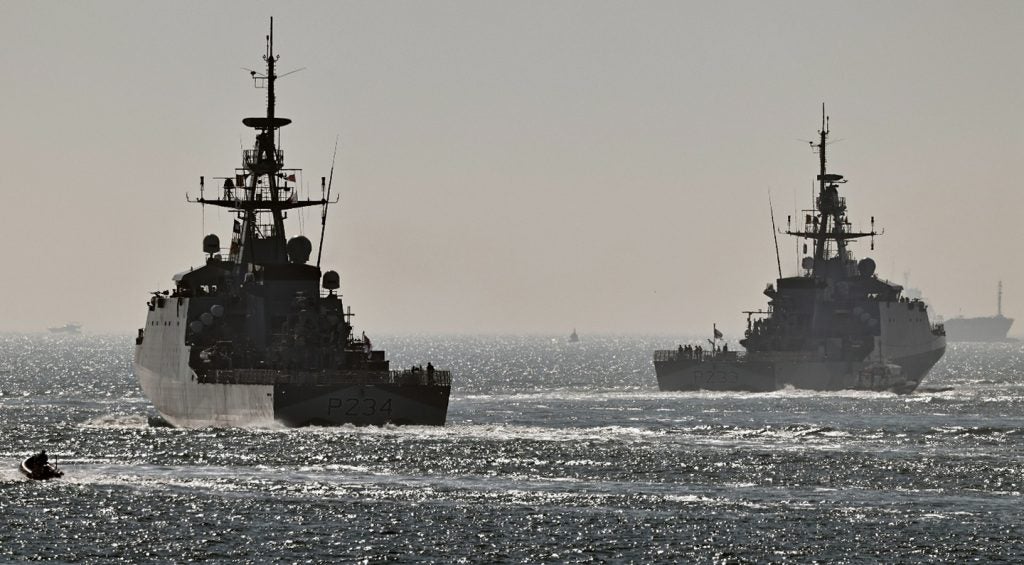Analysts within the UK’s Defence Science and Technology Laboratory (Dstl) affirmed that less is more as they help to improve the Royal Navy’s “global presence with fewer warships and sailors,” according to a press release on 2 December 2024.
Forward presence eliminates the long transit times and allows ships to remain in operational zones.
This nimble force structure is already a proven operational concept. The Navy already forward deploys Batch 2 River-class Offshore Patrol Vessels (OPVs) – HMSs Forth, Medway, Trent, Tamar, and Spey – in the South Atlantic, Mediterranean, and Indo-Pacific regions, where they are proving a diplomatic and military success.
As a result, the release maintained that this forward-basing model is “proving that five ships could do the work of 11".
Simply put, the Royal Navy plan to respond to global crises with greater agility through five forward-based ships with rotating crews compared to 11 ships operating from the UK.
Confident in this operational concept, Dstl confirmed that it will also apply the model to the Type 31 frigates, some of which are still in production, when they replace the ageing OPVs as “Counter-Fast Inshore Attack Craft” in the early 2030s.
This will enable the service to free up more advanced ships for higher-end operational tasks. It allows the Royal Navy to cover a broader range of commitments with fewer ships overall.
Cuts to Navy programmes
Ultimately, this reduced force structure comes from a place of insecurity as the MoD routinely cuts naval programmes as part of its cost-saving measures and their inability to replace obsolete platforms and equipment.
The Defence Secretary, John Healey, relayed a new round of cuts to several defence programmes in a session of Parliament on 20 November which largely impacted the Navy’s capabilities. As part of this, he scrapped two Albion-class amphibious assault ships, HMS Albion and Bulwark. Alongside this, Healey ruled out the possibility of extending the life of the ageing Type 23 frigate HMS Northumberland.
Following the cuts, Naval Technology found that the Royal Navy has just 73% of the 19 escorts that officials previously considered the “absolute minimum” required to perform its duties.

Is less really more?
Essentially, Dstl’s concept is a responsive solution to make the poor state of the UK’s naval forces work. It is not a proactive approach ideally suited for a new age of geostrategic competition. Resorting to a limited, albeit distributed, forward presence does not mean the Navy meets the ship count requirement for the government’s truly global strategic ambitions.
“The desire to drive greater and greater efficiencies from operations should be approached with caution.”
William Freer, Council of Geostrategy
“The desire to drive greater and greater efficiencies from operations should be approached with caution,” warns William Freer, National Security fellow, Council of Geostrategy. “This is fine in a peaceful era, but efficiency often comes at the cost of resilience and redundancy, which are of great utility in more volatile times.”
Nevertheless, Baroness Goldie, a former Minister of State, speaking in June 2023, was right to acknowledge that the Royal Navy was one of the few services in the world to have ships in every ocean on the planet in 2022. However, presence does not necessarily equate to credibility, as one current senior MoD official similarly overestimated more recently.
The US Navy – a much larger maritime force – is similarly wrestling with this problem. In the Indo-Pacific, the service requires more smaller, missile defence capable warships to outmatch China’s surface fleet in a potential conflict over Taiwan.
On 3 December 2024, the UK Defence Select Committee probed Lord Robertson of Port Ellen, the Lead Reviewer of the Strategic Defence Review (SDR), casting doubt on the UK’s global reach. It may be necessary to “focus more narrowly,” suggested one Committee member, Derek Twigg.
“We are very conscious of the global responsibilities the United Kingdom has,” Robertson mentioned. This is something that the SDR will need to clarify as it identifies ways to maintain the UK’s defence ties in the Indo-Pacific, the Gulf and Middle East, and all manner of places around the world.
Type 32 frigate
In the same breath, the MoD confirmed the ongoing status of the Type 32 future frigate programme. It is notable that the government has given this programme, currently in the conceptual stage, with many details that have yet to be ironed out, a nod ahead of the SDR in spring next year.
It is also curious that Type 32 is still on the table if its purpose was to increase the force level from 19 to 24 vessels when the five-platform increase was announced in 2020. Now that the Royal Navy will operate with fewer ships and sailors, it would be reasonable for someone to think the project would be in jeopardy.
However, with the rise of autonomous systems the Type 32 may still serve to house autonomous systems, particularly for mine countermeasure purposes.
“The Type 32 programme had been in something of a limbo for some time," noted Freer. "Hopefully the reference to Dstl taking ‘the same approach for the Type 32 frigate’ serves as confirmation that the programme is still going ahead," as the future programme expands Britain's forward presence.









